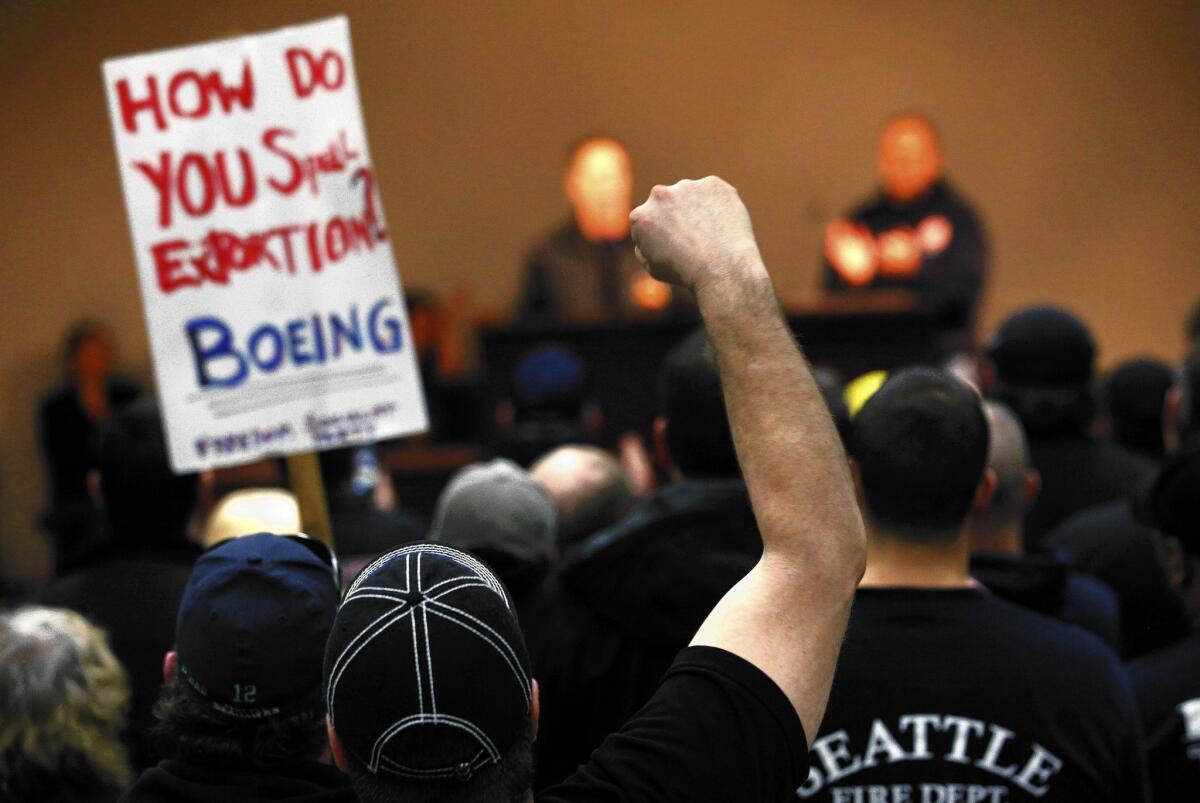Boeing’s hollow victory

- Share via
The narrowly approved contract agreement between Boeing and its Washington state workforce will be hailed by some as a victory for the canny, hardball brinkmanship of Boeing’s management and the knuckle-under economic pragmatism of the International Machinists Union.
But the steep cutbacks in retirement and health benefits that tens of thousands of Boeing workers were forced to swallow have far larger implications for middle-class America.
Boeing’s stingy treatment of its highly skilled workforce offers a vivid example of how America’s new economy has created gaping economic inequalities and steadily squeezed the economic life out of the U.S. middle class over the last three decades, even as corporate profits and CEO pay have skyrocketed.
PHOTO ESSAY: What last year’s biggest political blunders mean for 2014
Boeing’s case epitomizes that sharp economic divide. For just as the company was wringing concessions from its workers, its board of directors approved a 50% increase in the company’s stock dividend and a $10-billion stock buyback that will richly reward investors and executives who get paid in Boeing shares.
Boeing contends that it is not the first to impose such concessions but that it is merely following the market.
True enough. In 1980, 84% of American workers at companies with 100 or more employees received lifetime pensions from their companies, and 70% got health insurance fully paid for by their employers. Today, fewer than 30% have lifetime pensions and only 18% have fully employer-paid health insurance.
What these numbers mean is that every year hundreds of billions of dollars in benefit costs have been shifted from company books to the pocketbooks and checkbooks of average Americans, helping to boost corporate profits and to leave roughly half of the baby boom generation facing near poverty in retirement.
Boeing’s new contract will accelerate that trend. And it’s not as if hard economic times forced Boeing to slash labor costs. Its profits and demand for its planes are at record levels.
Over the last decade, Boeing rolled up more than $35 billion in profits and paid no federal corporate taxes. In fact, Boeing reaped about $2 billion in federal tax rebates from 2003 to 2012, as well as the most generous long-term state tax subsidy in U.S. history from Washington state.
For President Obama and others who advocate a fairer, faster-growing economy, it is instructive to understand how Boeing put the screws to its 56,000 workers around Seattle and Everett, Wash.
In a take-it-or-lose-your-jobs ultimatum last November, Boeing declared that if its current workforce wanted to build the next generation of 777X airliners, it would have to agree to about $1 billion of cuts in previously promised pay increases for younger workers, to sharp increases in employee contributions to healthcare, and to a massive restructuring of Boeing’s retirement plans. Boeing said it was freezing its pension plan, shifting tens of thousands of machinists into a far less generous 401(k)-type plan, and would then steadily reduce company contributions, year after year.
When that formula was put to a vote in November, the company’s 31,000 rank-and-file machinists rejected Boeing’s terms by a vote of 2 to 1. Boeing was ready, perhaps even eager, for that outcome, and despite Washington state’s offer of $8.7 billion in tax concessions, Boeing invited other states to bid on hosting the 777X production.
By Christmas, Boeing had lured 22 states into a massive job auction, ready to reward the lowest bidder — the state offering the lowest tax rate, lowest worker benefits and wages, and lowest cost to Boeing (i.e, largest state subsidy) to finance the $10-billion cost of new aircraft plants.
Some experts questioned the wisdom of Boeing’s tactics. After all, making modern airliners requires thousands of skilled, well-trained engineers and machinists, experienced at designing and weaving together the most advanced materials and complex engineering of the 21st century.
Boeing said it had to cut costs to meet “aggressive international competition.” But Boeing’s sole major global competitor is Airbus, based in highly unionized Germany and France, and Airbus puts a premium on maintaining its high-quality workforce and treating its workers generously.
German companies over the last 25 years have raised the pay and benefits of middle-class workers five times faster than U.S. companies. And German corporations have kept high-tech jobs at home, so that today 21% of Germany’s workforce is in manufacturing versus 9% in the U.S. What’s more, the German strategy has rolled up $2 trillion in export surpluses while the U.S. has suffered $6 trillion in trade deficits.
Inside Boeing, some people must have had some second thoughts. Even while noisily threatening to move out of state, Boeing sweetened its offer to its Washington workforce. In late December, it added an estimated $1 billion in value, restoring previous pay scales for newer workers and upping the contract-signing bonus to $15,000 per worker. But Boeing still insisted on steep retirement and health benefit cuts.
Local union leaders opposed the new package. National union leaders called for a second vote last Friday, and the Boeing contract passed narrowly, by 51%. Some union leaders hope to gain leverage and better terms once the 777X goes into production.
But rolling back the clock on the shrinking middle-class share of America’s economic pie has proved virtually impossible lately. For now, the Boeing formula represents the kind of successful corporate power play that prompted Pope Francis recently to chastise modern capitalism for imposing “the dictatorship of an impersonal economy lacking a truly human purpose.”
Hedrick Smith is the author of “Who Stole the American Dream?” and former Washington bureau chief of the New York Times.
More to Read
A cure for the common opinion
Get thought-provoking perspectives with our weekly newsletter.
You may occasionally receive promotional content from the Los Angeles Times.









